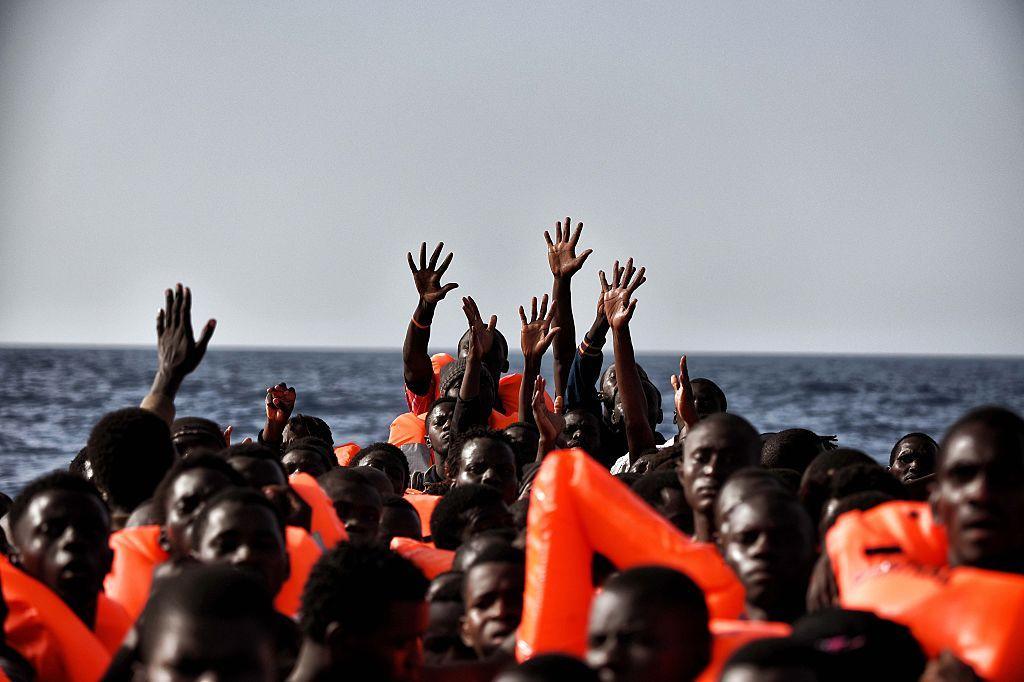EU ‘letting refugees die’ at sea after cancelling Mediterranean rescue missions
EU operation has rescued 49,000 people at sea since it launched in 2015

The European Union has been accused of leaving refugees to die at sea in an effort to deter migration, following reports that it will downgrade its maritime rescues in the Mediterranean.
Operation Sophia has been credited with saving tens of thousands of lives since it was launched in 2015, at the height of the migrant crisis. The EU mission was aimed at disrupting people traffickers and rescuing migrants attempting to make the dangerous crossing from north Africa in rickety boats.
But diplomats said this week that the operation will no longer carry out maritime patrols after Italy refused to continue receiving those rescued at sea. It will instead rely on air patrols and closer coordination with Libya, according to diplomats.
The move has been roundly condemned by charities and rights groups, which said cancellation of rescue missions move will lead to more deaths in the Mediterranean.
“It shows again that the EU considers it acceptable to let people die at sea as a deterrence for migration,” said Hassiba Hadj-Sahraoui, of Doctors Without Borders, which until recently operated its own rescue mission.
“Meanwhile, European countries continue to support the Libyan coastguard despite their clear lack of responsiveness to distress calls, and knowing that those people the Libyan coastguard do intercept will end up in horrible and inhumane detention centres,” she added.
Migrants stranded on Greek island
Show all 11Amnesty International called it an “outrageous abdication of EU governments responsibilities”.
“Having already used every excuse in the book to banish NGO rescue boats from the Mediterranean, and having already stopped carrying out rescues several months ago, EU governments are now removing their own ships, leaving no one to save the lives of women, men and children in peril,” said Matteo de Bellis, Amnesty International’s migration researcher.
“This shameful decision has nothing to do with the needs of people who risk their lives at sea, but everything to do with the inability of European governments to agree on a way to share responsibility for them.”
Operation Sophia has rescued almost 49,000 people trying to reach Europe, according to the EU.
While the number of refugees crossing the Mediterranean has steadily declined in recent years, more than 11,000 have made it across since January, according to the UN.
Almost 2,300 people died in 2018 trying to make the journey, compared to 3,000 in 2017. So far this year, an estimated 283 have perished during the crossing.
The downgrading of the EU mission appears to have come as a result of pressure from Italy, where anti-refugee sentiment is high and a populist government has cracked down on charity rescue missions operating off its coast.
Italy’s deputy prime minister Matteo Salvini has said his country would no longer be the main point of disembarkation for people trying to cross the Mediterranean by boat and rescued by Sophia’s patrol ships.
Rome called for other countries to open up their ports instead, but no other EU states came forward. Diplomats said countries including Spain, France and Germany signalled they were not willing to host more rescued people – most of whom are fleeing wars and poverty in Africa and the Middle East.
The mission’s mandate was due to expire this week, and needed the agreement of all EU governments to continue. With Italy reportedly threatening to veto unless the maritime rescues were halted, a tentative deal was reached for it continue for another six months without them.
The new arrangement will involve more training of the coastguard in Libya, where lawlessness has allowed smugglers to openly operate sending people to Europe by sea.
Additional reporting by Reuters
Subscribe to Independent Premium to bookmark this article
Want to bookmark your favourite articles and stories to read or reference later? Start your Independent Premium subscription today.

Join our commenting forum
Join thought-provoking conversations, follow other Independent readers and see their replies